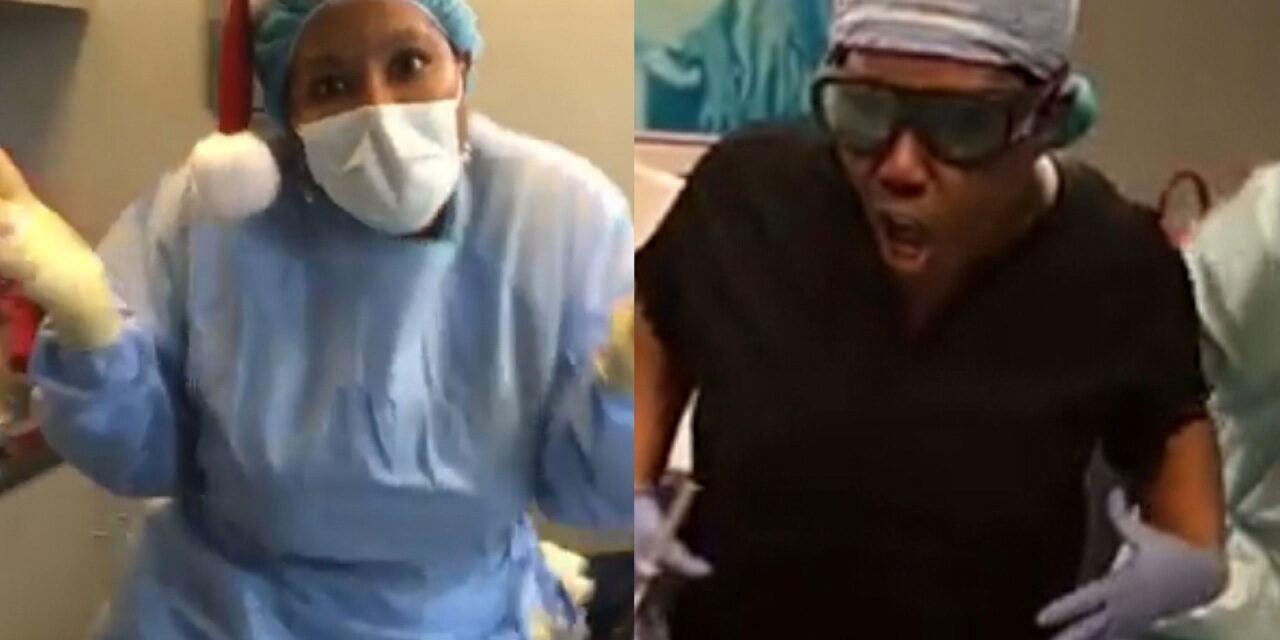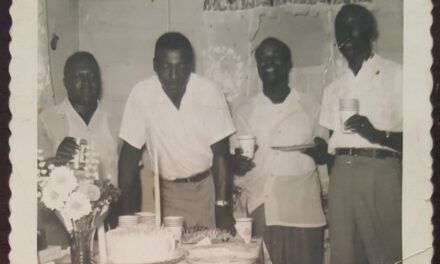“Them bricks is way too hot, you need to cut it;
Your price is way too high, you need to cut it”
It was almost funny. The song. The irony of the occasion.
And there she was. Leering garrishly into the camera. Leaning in for an upclose shot, as OT Genasis chanted,
“Cut it, cut it, cut it, cut it;
Cut it, cut it, cut it, cut it”.
And if I hadn’t heard about the story, and seen some of the headlines, I would have thought that this was simply a parody of a real life operative endeavor… something akin to a Weird Al Yankovich video… just a modern day African-American female version of him.
But that’s not at all what this was. It was quite far from that.
There was something a lot darker about this. Its unprofessional nature; its breach of ethics… and it ended up becoming something incredibly tragic.
This was the story of a Dermatologist turned Cosmetic Surgeon, who lacked the appropriate training or credentials necessary to carry out the surgeries upon which she’d built her practice, her persona and her success.
Dr. Windell Boutte’s website touted her as, “…Atlanta’s most experienced cosmetic surgeon…”.
While she may have been the most experienced, it appears that she was not at all the most qualified. And despite the number of cases that she’d done, over time, she had proven herself to become increasingly reckless, as opposed to increasingly skilled.
Frequency of experience does not always coincide with level of expertise… or with successful outcomes.
Consider the Chicago Cubs who have been the only Major League Baseball team to play for 108 years without a World Series Win. In addition to this being a nubious record-breaking accomplishment for baseball, it was also a first for any major North American sport. 108 years of experience did not translate into sufficient expertise or success.
“The term ‘experience’ refers to acquiring skills and knowledge in a certain field over a number of years. Experience has mostly to do with numbers and how many years spent in a particular field or doing something particular.”
“The term, ‘expertise’ has to do more with skills and knowledge and is irrelevant of the number of years in that particular field.”
-“Differencbetween.info”
At this point, one must certainly question, not only Dr. Boutte’s judgment, but her expertise, as well. The unusually high number of lawsuits filed against Dr. Boutte in a relatively short period of time call into question any expertise that she may ever have had.
Eventually, her lack of surgical skill and clinical knowledge caught up to her; but not before costing one of her patients their health and well-being.
Icilma Cornelius trusted in the words on Dr. Boutte’s website. Weeks before she was to finish her PhD and get married, she consulted with Boutte regarding Botox injections. At that consultation, she was persuaded to get a “tummy tuck” and lipo-suction, in preparation for her big day. She wanted things to be perfect for her wedding, and so, she ponied up $11, 284.50 and trusted that her physician would make her more beautiful.
Unfortunately, Cornelius never completed her degree, nor did she get married. In fact, she never again would be able to perform basic functions of life, independently, after walking into Boutte’s office for what she believed would be an indelible transformation.
Indeed, a transformation did occur… but one that Icilma Cornelius may never have imagined. As a result of all that happened that day, she is now permanently and severely brain-damaged and completely dependent upon others for her care.
Her family sued and the case was settled for an undisclosed amount (some sources suggest that the settlement amount was upwards of $10,000,000). Unfortunately, there is no amount that can restore all that was lost. The best that could come of it is the hope that the amount will be sufficient to take care of all of her needs for the remainder of her natural life.
So, what happened to Icilma Cornelius?
Court documents and news stories about this case have described that Cornelius underwent an 8 hour procedure in Dr. Boutte’s office without the benefit and safety of appropriate monitoring equipment, like an end-tidal CO2 monitor.
The absence of such equipment played a pivotal role in leading to such a tragic outcome.
End-tidal CO2 monitors allow the physician(s) and staff to know that a patient’s oxygen level is falling. They measure carbon dioxide in the blood. The significance of CO2 is that it makes the blood more acidic, thereby signaling that the patient is suffering oxygen depletion to the tissues within the body. Such equipment allows the anesthesia staff to make adjustments in supplemental oxygen, as well as medications that may be influencing the patient’s physiologic responses. In the absence of an end-tidal CO2 monitor, it is very difficult to know that a patient may be at risk.
Eventually, Cornelius went into cardiac arrest. This further depleted blood and oxygen to her brain.
Once emergency medical personnel arrived, their ability to quickly transfer Mrs. Cornelius to a higher level of care was hampered by the fact that Dr. Boutte insisted on closing her wounds first, so as to minimize the risk of a wound infection.
While a wound infection can be serious, it pales in comparison to a prolonged lack of oxygen to the brain. It would have been more appropriate to ensure that there was no significant bleeding from the wound; cover it in as sterile a fashion as possible, and swiftly transfer her to a hospital emergency room. After she was stabilized from the cardiac arrest, the wound could always have been closed.
Even if she suffered a wound infection, at least her brain would still work at its fullest capacity.
The additional 30 minutes spent closing her wound allowed for an extended period of time in which Cornelius was receiving little, if any, oxygen to her brain.
The next obstacle was one of access. It appears that the elevator in Dr. Boutte’s office building was not equipped to fit a medical gurney. The paramedics had to carry Icilma’s gurney down the stairs, which further delayed her getting the care that she so desperately needed.
The result of all of this has been the permanent incapacitation of a woman who was once vibrant and had a full life ahead of her. As a result, she has required rehabilitation, nursing home care, medication and around the clock home health care. Simple tasks like eating, bathing and dressing herself, she will always need assistance with.
Donna Shah, another woman who has filed suit against Boutte, has alleged that she suffered “… abdominal wall and gluteal cellulitis; aspiration pneumonia; acute respiratory failure; acute renal failure; severe sepsis due to cellulitis and pneumonia; severe anemia due to acute blood loss from the liposuction; acute left gastrocnemius vein thrombosis, transient hypotension, leukocytosis, and tachycardia…” as a result of liposuction that she received at Boutte’s hands.
Her complaint further states that when she contacted Dr. Boutte about her post-operative pain, she was never advised to seek medical care. She later was admitted to the hospital with the aforementioned complications.
Finally, Shah has alleged that Boutte’s personal housekeepers also clean her clinic. Ms. Shah says that proper infection control was not being practiced, and that this led to the great extent and severity of her infections.
It does make you wonder whether her housekeeping staff also lacked knowledge and expertise as to how to appropriately sanitize and disinfect a medical facility.
It is frightening that so many things could be out of order, in what appeared to be a safe and appropriate medical environment. But, in reality, Windell Boutte’s office and her practice of medicine itself, were frought with hazards.
From a few of the videos that I saw, if this is representative of how she operates, then she grossly deviates from acceptable and standard practices. This would (and should) scare the hell out of any potential patients.
Among the concerns:
• Poor sterile technique;
• Staff dancing with her in the OR while patients are anesthetized and exposed;
• Dr. Boutte dancing around and touching objects OUTSIDE OF THE STERILE FIELD while she was gowned and gloved;
• The anesthetist pointing into the operative field with non-sterile gloves;
• And just the horseplay, which seemed comfortable and commonplace to her AND her staff, was alarming to see;
• It turns out that she’s a Dermatologist, who decided to carry out cosmetic surgery in her office with a cash pay operation. (Therefore, no accountability to an insurance company that would demand that certain standards be met.)
• She was not certified in conscious sedation, and was unable to intubate patients or give general anesthesia;
• Her office was neither certified nor classified as a surgical center (and should have been). It probably did not meet the many qualifications for this, one of which says that there must be full EMS accessibility, so that any patient suffering an intra-operative complication can be quickly and easily transferred to a hospital. We know that, at the very least, the elevator did not meet these requirements.
• Ultimately, her decision: to dance and cavort while patients were under anesthesia, and sometimes while waving a scalpel; to videotape her patients in an exposed and unconscious state; and to encourage horseplay with and by her support staff, suggest that she failed to appreciate the gravity of the work that she was doing… that she failed to understand that her patients had entrusted her with their care, and to do them no harm. The videos that she created and then posted to market her practice were the biggest clues that Windell Boutte just did not give a damn.
Her made-up rap to the music of “Bad and Boujee” illustrate just how much of a damn she did not give.
“My patients are bad and boujee. Building up fat in the booty. My patients are snatched with big booties. We got tummy tucks and BBLs (Brazilian Butt Lifts) TOO!”
So, what can you do to make sure that you do not end up in the hands of a physician like Dr. Boutte? What can you do in order to ensure that, if you go to a medspa or private office for an elective cosmetic procedure, that you do not end up disfigured like the 6 other patients who have sued Dr. Boutte since 2016? Or like the 100 or so women who have come forward with complaints about her since the Icilma Cornelius story broke?
The answer to this is that you must be your own best advocate, which means becoming an educated consumer as it relates to your medical care. This is especially important if you are having a medical procedure outside of a hospital or surgical center setting.
Here are some valuable tips and things to look out for:
• CREDENTIALS: Ask about the surgeon’s credentials. Given that any physician can open a medspa, look for the TYPE of residency and/or fellowship that they have completed that would qualify your physician to do the procedure that you are seeking; Does the physician have a board certification in cosmetic surgery/plastic surgery (are these different certifications?)
• TRAINING: It appears that Boutte is a trained Dermatologist. Given that, it is likely that, while she may have attended occasional weekend long courses in plastic surgery, she never received proper surgical training in the discipline. Typically, a Plastic Surgery resident would have completed a 5 year training program, after medical school, with 2 of those years being in General Surgery and 3 in Plastics. Because Dr. Boutte has an independent office with no hospital affiliation, there was no one to ensure that she was sufficiently qualified and skilled to carry out these procedures.
• Also keep in mind that when insurance is being used for payment, there are certain standards of credentialing that must be met. These often include proof of residency and fellowship training. However, In a cash-pay operation, like Dr. Boutte’s, this check-and-balance does not apply. Therefore, it would behoove you to ask questions about your physician’s training.
• Does the physician have privileges at a hospital or actual surgical center? Are the facilities where they operate approved and accredited by the JCAHO? If the physician does not have privileges at any area hospital, and is conducting surgery only within his or her office, ask more questions. Please keep in mind that in an independent office, there may be very little oversight that what is being done is safe and meets the standard of care.
• If surgical procedures are performed in an office, check proximity of the office to a hospital. Can a stretcher easily get in and out? Does the parking lot have adequate space for an ambulance to park? Are there code carts available and are their medications up-to-date? Who administers sedation and what is the set up? Is the office and physician licensed by the state to administer conscious sedation?
• Look at a practice’s website, as well as any ads that you can find. Ask yourself whether or not you feel comfortable with how this physician or practice has marketed itself;
• Consider checking with your state’s licensing/medical board regarding previous lawsuits or disciplinary actions. Keep in mind that for physicians in surgical specialties, it is not uncommon to have been named in a lawsuit over the course of many years, and this does not imply any improprieties or lack of competency. However, multiple lawsuits, especially over a short period of time, or for the same allegations, should raise a few red flags.
Many surgeons listen to music in the OR. It is not a discouraged practice as long as they are not breaking with sterile procedure in order to change the tunes, and as long as the music is not a distraction.
I have never, however, seen a surgeon dance in the OR, or do anything that would promote reckless behavior with or by their staff. I would go so far as to say that most surgeons take this aspect of their job quite seriously, and would neither compromise their patients nor themselves in such a manner.
I am at a loss for what to think about this particular colleague.
I believe that she had to have known that none of this was acceptable medical practice, yet she filmed it AND uploaded it to YouTube… much like a burglar who stops to look up and grin for the surveillance camera.
The fact that she did this multiple times eliminates the notion that she suffered a momentary lapse in judgment. Instead, it suggests a deeper underlying issue, and raises the question of amorality versus a psychiatric malady.
Either way, it was terrible. And it was not so much her dancing that was the problem. Rather, it was her cavalier attitude and disregard that has brought the most harm to the patients that she served.










